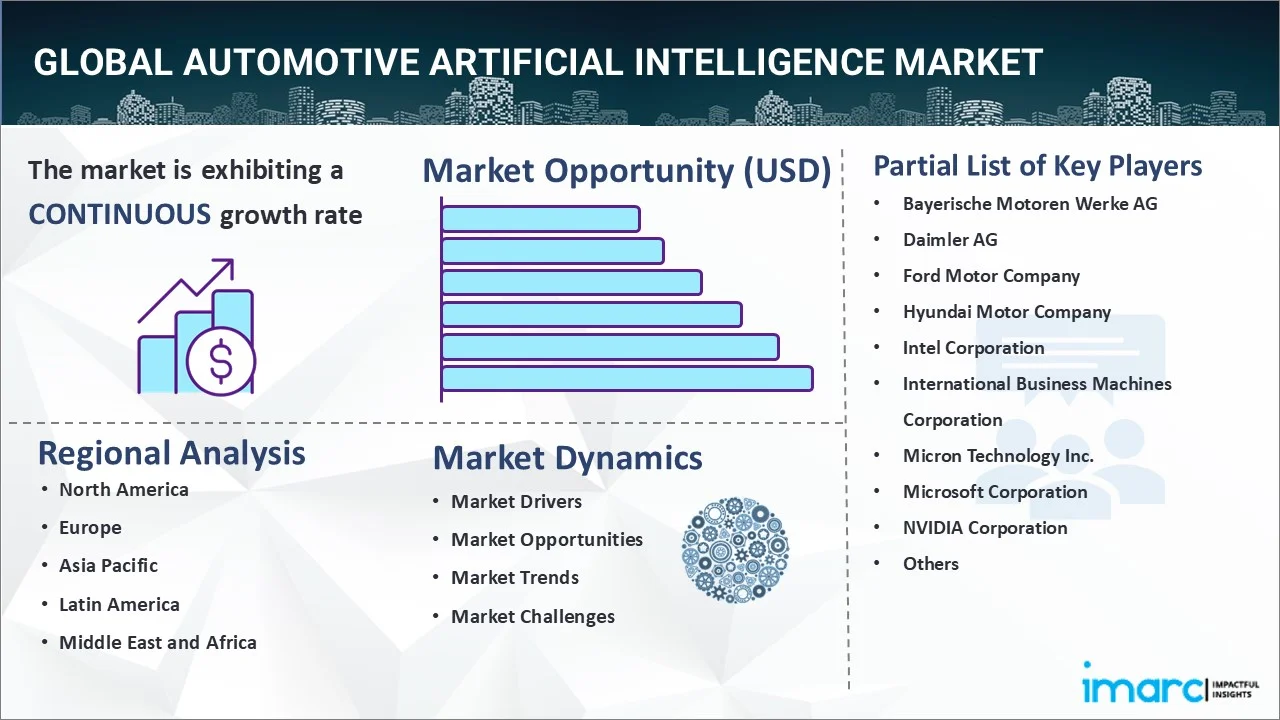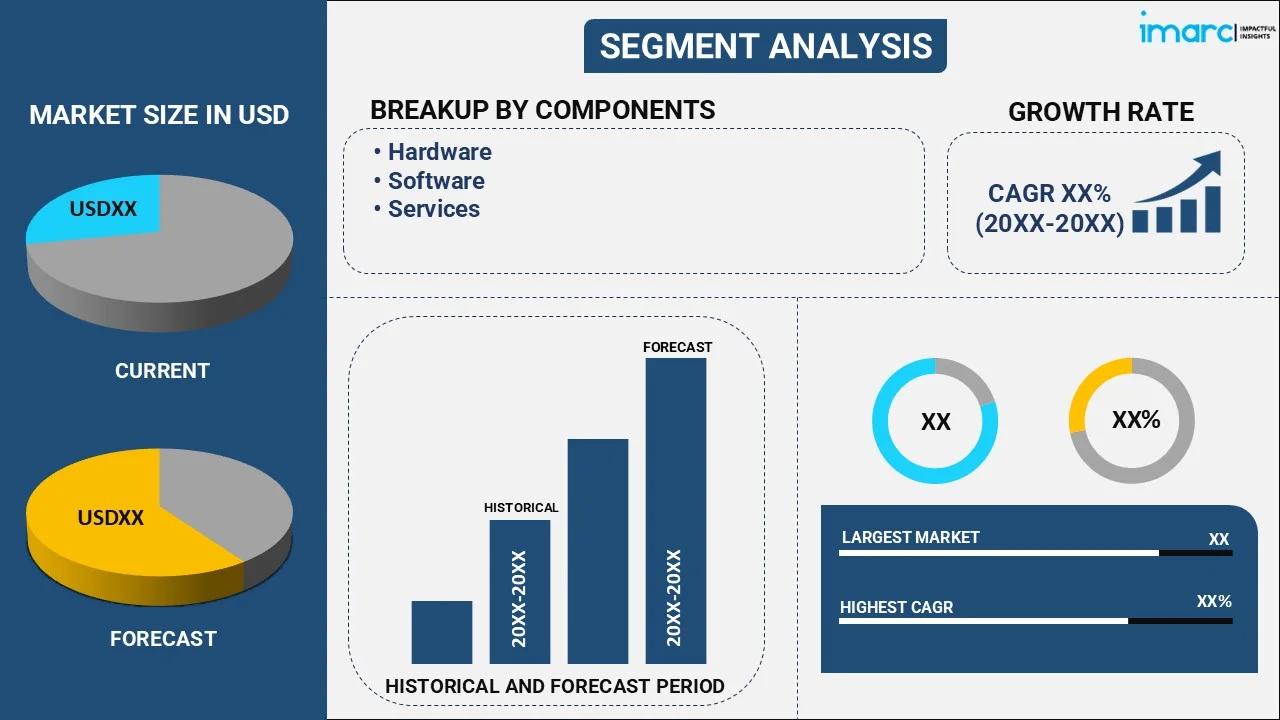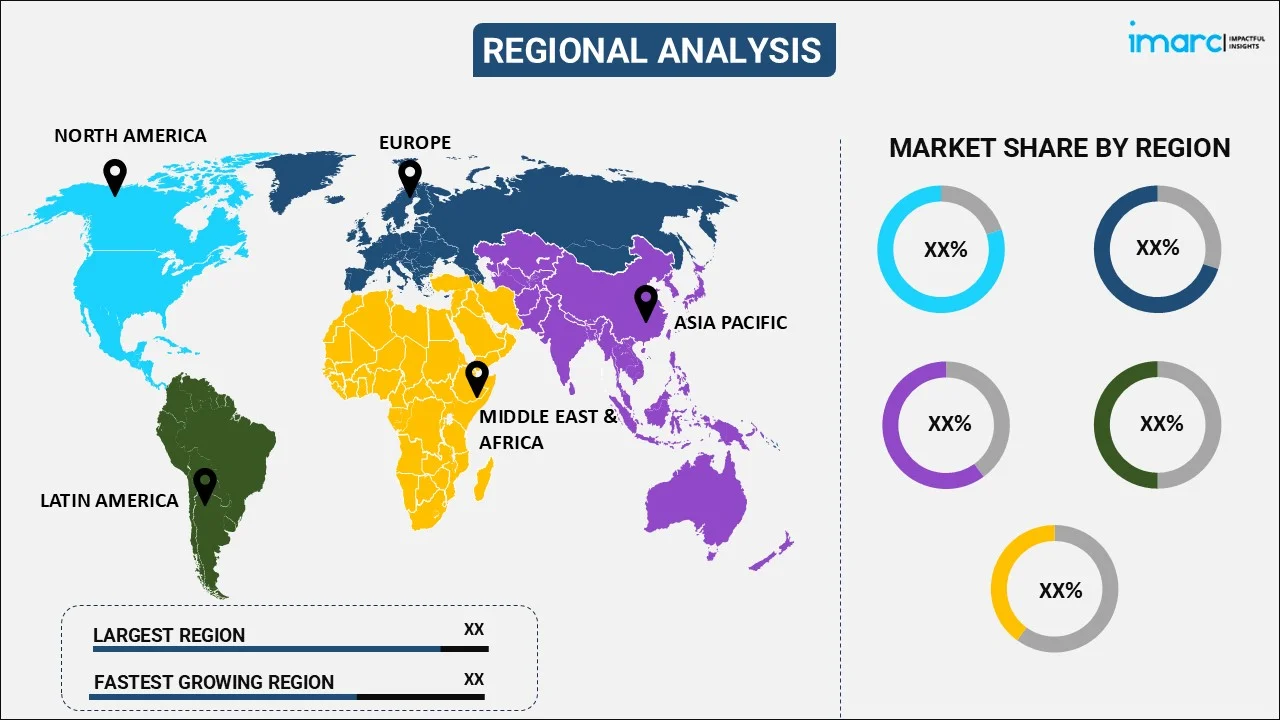
Automotive Artificial Intelligence Market Report by Component (Hardware, Software, Services), Technology (Machine Learning and Deep Learning, Computer Vision, Natural Language Processing), Process (Data Mining, Image Recognition, Signal Recognition), Application (Semi-Autonomous, Autonomous), and Region 2025-2033
Global Automotive Artificial Intelligence Market:
The global automotive artificial intelligence market size reached USD 5.0 Billion in 2024. Looking forward, IMARC Group expects the market to reach USD 47.3 Billion by 2033, exhibiting a growth rate (CAGR) of 25.3% during 2025-2033. The growing need for traffic management and route optimization is propelling the market growth. At present, North America holds the largest market share owing to strong technological infrastructure and rapid growth in the adoption of advanced automotive solutions.
|
Report Attribute
|
Key Statistics
|
|---|---|
|
Base Year
|
2024
|
|
Forecast Years
|
2025-2033
|
|
Historical Years
|
2019-2024
|
|
Market Size in 2024
|
USD 5.0 Billion |
|
Market Forecast in 2033
|
USD 47.3 Billion |
| Market Growth Rate (2025-2033) | 25.3% |
Automotive Artificial Intelligence Market Analysis:
- Major Market Drivers: The rapid cost reduction in sensor technology and computing power is making AI implementation more viable for manufacturers, which is positively impacting the market growth.
- Key Market Trends: The increasing emphasis on sustainability and the growing consumer demand for advanced features are among the emerging trends catalyzing the market growth.
- Competitive Landscape: Some of the prominent companies in the global market include Bayerische Motoren Werke AG, Daimler AG, Ford Motor Company, Hyundai, Motor Company, Intel Corporation, International Business, Machines Corporation, Micron Technology Inc., Microsoft Corporation, NVIDIA Corporation, Qualcomm Incorporated, Tesla Inc., Toyota Motor Corporation, and Uber Technologies Inc., among many others.
- Geographical Trends: North America exhibits a clear dominance in the market due to the presence of many tech-based companies in this region. Besides this, the rising usage of smart vehicles is also stimulating the market.
- Challenges and Opportunities: Data privacy and security concerns are hindering the market. However, developing robust encryption methods and industry-wide standards will continue to fuel the market in the coming years.

Automotive Artificial Intelligence Market Trends:
Rising Adoption of Autonomous Vehicles
The automotive industry is experiencing a significant shift towards autonomous vehicles, driven by advancements in AI technologies. Companies are investing in AI to develop vehicles capable of navigating and making decisions without human intervention. The continuous improvement in machine learning algorithms and real-time data processing is making autonomous vehicles a reality. In line with this, they reduce production costs and waste, thereby making treatments more affordable and accessible. For instance, in June 2024, Rimac Group, one of the EV companies, launched the level four autonomous electric car brand “Verne,” which will be available by 2026. This, in turn, represents one of the automotive artificial intelligence price trends.
Demand for Personalized In-car Experience
AI is increasingly being used to create personalized in-car experiences for passengers and drivers. This includes the AI-driven safety features that monitor driver behavior to prevent accidents and the integration of AI-powered voice assistants that can understand and respond to natural language commands. The trend towards personalization is enhancing the experience of users, making vehicles more responsive to individual needs, and is expected to continue as AI technologies evolve. For example, in January 2024, NVIDIA announced that Li Auto, GWM, ZEEKR, and Xiaomi are adopting the NVIDIA DRIVE Thor and Orin platforms for personalized in-car AI experiences. These adoptions enhance autonomous driving, AI-driven safety, and intelligent vehicle functionalities in next-generation fleets. This is elevating the automotive artificial intelligence market statistics.
Development of Connected Vehicle Ecosystem
AI enables vehicles to communicate with each other and with city infrastructure, reducing congestion and enhancing road safety. As smart city initiatives expand, the integration of AI in connected vehicles is expected to increase, thereby stimulating the market growth. For example, in August 2024, Intel introduced a new graphics processing unit (GPU) for cars in mainland China. It is specifically designed to power in-vehicle AI capabilities.
Global Automotive Artificial Intelligence Industry Segmentation:
IMARC Group provides an analysis of the key trends in each segment of the market, along with the automotive artificial intelligence market forecast at the global, regional, and country levels for 2025-2033. Our report has categorized the market based on the component, technology, process, and application.
Breakup by Component:

- Hardware
- Software
- Services
Hardware currently holds most of the automotive artificial intelligence market demand
The report has provided a detailed breakup and analysis of the market based on the component. This includes hardware, software, and services. According to the report, hardware represented the largest market segmentation.
Hardware is an essential component for enabling advanced functionalities with sensors, powerful processors, and GPUs facilitating real-time data processing. These components are crucial for supporting driver assistance systems, autonomous driving, and other AI-driven vehicle technologies.
Breakup by Technology:
- Machine Learning and Deep Learning
- Computer Vision
- Natural Language Processing
The report has provided a detailed breakup and analysis of the market based on the technology. This includes machine learning and deep learning, computer vision, and natural language processing.
Machine learning and deep learning are pivotal in the market, driving advancements in autonomous driving, predictive maintenance, and adaptive systems. These technologies enable vehicles to learn from data, improving decision-making and enhancing overall safety and performance. Apart from this, computer vision offers seamless integration, which is expanding the automotive artificial intelligence industry trends.
Breakup by Process:
- Data Mining
- Image Recognition
- Signal Recognition
Data mining dominates the automotive artificial intelligence market outlook
The report has provided a detailed breakup and analysis of the market based on the process. This includes data mining, image recognition, and signal recognition. According to the report, data mining represented the largest market segmentation.
For personal mobility, artificial data mining is crucial in the automotive AI market, enabling the extraction of valuable insights from vast amounts of vehicle data. This process supports the development of predictive maintenance, driver behavior analysis, and enhanced safety features, driving innovation and efficiency.
Breakup by Application:
- Semi-Autonomous
- Autonomous
Semi-autonomous holds the majority of the global automotive artificial intelligence market revenue
The report has provided a detailed breakup and analysis of the market based on the application. This includes semi-autonomous and autonomous. According to the report, semi-autonomous represented the largest market segmentation.
Semi-autonomous vehicles are a key focus in the automotive AI market, utilizing AI-driven technologies for tasks like lane-keeping, adaptive cruise control, and automated parking. These features enhance driving safety and convenience while paving the way for fully autonomous systems. In March 2023, Ford Motor Company established Latitude AI, a subsidiary, to introduce new automated driving technologies.
Breakup by Region:

- North America
- United States
- Canada
- Asia-Pacific
- China
- Japan
- India
- South Korea
- Australia
- Indonesia
- Others
- Europe
- Germany
- France
- United Kingdom
- Italy
- Spain
- Russia
- Others
- Latin America
- Brazil
- Mexico
- Others
- Middle East and Africa
North America exhibits a clear dominance in the market
The automotive artificial intelligence market research report has also provided a comprehensive analysis of all the major regional markets, which include North America (the United States and Canada); Asia Pacific (China, India, South Korea, Australia, Indonesia, and others); Europe (Germany, France, the United Kingdom, Italy, Spain, Russia, and others); Latin America (Brazil, Mexico, and others); and the Middle East and Africa. According to the report, North America accounted for the largest automotive artificial intelligence market share.
The market growth in North America is driven by substantial investments in R&D activities, robust technological infrastructure, and regulatory support from government agencies. Besides this, the escalating demand for enhanced automotive software is also acting as another significant growth-inducing factor. In August 2024, the U.S. Department of Energy announced approximately USD 1.7 Billion to improve automotive AI across the country by supporting the development of electric vehicles, ensuring competitiveness, and securing thousands of jobs in traditional manufacturing communities.
Competitive Landscape:
The market research report has provided a comprehensive analysis of the competitive landscape. Detailed profiles of all major market automotive artificial intelligence companies have also been provided. Some of the key players in the market include:
- Bayerische Motoren Werke AG
- Daimler AG
- Ford Motor Company
- Hyundai Motor Company
- Intel Corporation
- International Business Machines Corporation
- Micron Technology Inc.
- Microsoft Corporation
- NVIDIA Corporation
- Qualcomm Incorporated
- Tesla Inc.
- Toyota Motor Corporation
- Uber Technologies Inc.
(Please note that this is only a partial list of the key players, and the complete list is provided in the report.)
Automotive Artificial Intelligence Market Recent Developments:
- August 2024: Intel introduced a new graphics processing unit (GPU) for cars in mainland China. It is specifically designed to power automotive AI capabilities.
- June 2024: Rimac Group, one of the EV companies, launched the level four autonomous electric car brand “Verne,” which will be available by 2026.
- January 2024: NVIDIA announced that Li Auto, GWM, ZEEKR, and Xiaomi are adopting the NVIDIA DRIVE Thor and Orin platforms for personalized in-car AI experiences.
Automotive Artificial Intelligence Market Report Scope:
| Report Features | Details |
|---|---|
| Base Year of the Analysis | 2024 |
| Historical Period | 2019-2024 |
| Forecast Period | 2025-2033 |
| Units | Billion USD |
| Scope of the Report | Exploration of Historical Trends and Market Outlook, Industry Catalysts and Challenges, Segment-Wise Historical and Predictive Market Assessment:
|
| Components Covered | Hardware, Software, Services |
| Technologies Covered | Machine Learning and Deep Learning, Computer Vision, Natural Language Processing |
| Processes Covered | Data Mining, Image Recognition, Signal Recognition |
| Applications Covered | Semi-Autonomous, Autonomous |
| Regions Covered | Asia Pacific, Europe, North America, Latin America, Middle East and Africa |
| Countries Covered | United States, Canada, Germany, France, United Kingdom, Italy, Spain, Russia, China, Japan, India, South Korea, Australia, Indonesia, Brazil, Mexico |
| Companies Covered | Bayerische Motoren Werke AG, Daimler AG, Ford Motor Company, Hyundai Motor Company, Intel Corporation, International Business Machines Corporation, Micron Technology Inc., Microsoft Corporation, NVIDIA Corporation, Qualcomm Incorporated, Tesla Inc., Toyota Motor Corporation, Uber Technologies Inc., etc. |
| Customization Scope | 10% Free Customization |
| Post-Sale Analyst Support | 10-12 Weeks |
| Delivery Format | PDF and Excel through Email (We can also provide the editable version of the report in PPT/Word format on special request) |
Key Benefits for Stakeholders:
- IMARC's industry report offers a comprehensive quantitative analysis of various automotive artificial intelligence market segments, historical and current market trends, market forecasts, and dynamics of the market from 2019-2033.
- The research report provides the latest information on the market drivers, challenges, and opportunities in the global automotive artificial intelligence market.
- The study maps the leading, as well as the fastest-growing, regional markets. It further enables stakeholders to identify the key country-level markets within each region.
- Porter's five forces analysis assists stakeholders in assessing the impact of new entrants, competitive rivalry, supplier power, buyer power, and the threat of substitution. It helps stakeholders to analyze the level of competition within the automotive artificial intelligence industry and its attractiveness.
- The competitive landscape allows stakeholders to understand their competitive environment and provides insight into the current positions of key players in the market.
Key Questions Answered in This Report
The global automotive artificial intelligence market was valued at USD 5.0 Billion in 2024.
We expect the global automotive artificial intelligence market to exhibit a CAGR of 25.3% during 2025-2033.
The increasing demand for premium vehicles, along with the introduction of vehicle tracking software to provide a live update of a vehicle in different locations efficiently and effectively, is primarily driving the global automotive artificial intelligence market growth.
The sudden outbreak of the COVID-19 pandemic had led to the implementation of stringent lockdown regulations across several nations, resulting in the temporary closure of numerous automobile manufacturing units, thereby negatively impacting the global market for automotive artificial intelligence.
Based on the component, the global automotive artificial intelligence market can be segmented into hardware, software, and services. Currently, hardware holds the majority of the total market share.
Based on the process, the global automotive artificial intelligence market has been bifurcated into data mining, image recognition, and signal recognition, where data mining currently exhibits a clear dominance in the market.
Based on the application, the global automotive artificial intelligence market can be divided into semi-autonomous and autonomous. Currently, semi-autonomous accounts for the largest market share.
On a regional level, the market has been classified into North America, Asia-Pacific, Europe, Latin America, and Middle East and Africa, where North America currently dominates the global market.
Some of the major players in the global automotive artificial intelligence market include Bayerische Motoren Werke AG, Daimler AG, Ford Motor Company, Hyundai Motor Company, Intel Corporation, International Business Machines Corporation, Micron Technology Inc., Microsoft Corporation, NVIDIA Corporation, Qualcomm Incorporated, Tesla Inc., Toyota Motor Corporation, and Uber Technologies Inc.
Need more help?
- Speak to our experienced analysts for insights on the current market scenarios.
- Include additional segments and countries to customize the report as per your requirement.
- Gain an unparalleled competitive advantage in your domain by understanding how to utilize the report and positively impacting your operations and revenue.
- For further assistance, please connect with our analysts.
 Request Customization
Request Customization
 Speak to an Analyst
Speak to an Analyst
 Request Brochure
Request Brochure
 Inquire Before Buying
Inquire Before Buying




.webp)




.webp)












